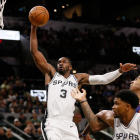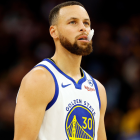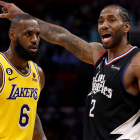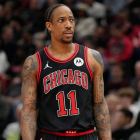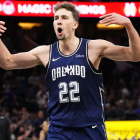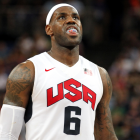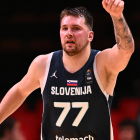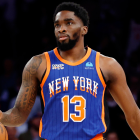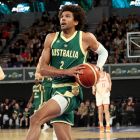NEW YORK -- Brandon Paul signed his first guaranteed NBA contract at the age of 26, during his third NBA Summer League, following four seasons split between BC Nizhny Novgorod in Russia, the Canton Charge of the NBA G League, Joventut Badalona in Spain and Anadolu Efes in Turkey. On Paul's phone, he keeps a list of all the different cities he has visited around the world. He also still has notes with basic Russian and Turkish phrases, which he needed so he could order food without incident.
Now a member of the San Antonio Spurs, Paul has different things to worry about, like carving himself a consistent role in coach Gregg Popovich's rotation. In an interview with CBS Sports before the Spurs' 100-91 win against the New York Knicks on Tuesday, Paul looked back at his unconventional path, one that many overseas players would love to follow.
"It's pretty cool, man, to be able to tell my story," Paul said. "I hope it inspires a lot more."
The following Q&A has been lightly edited for clarity and flow.
CBS: When you're in Russia and not playing as much as you'd like, what does it take to keep that self-belief that this is still going to work out?
Brandon Paul: A lot of mental toughness, man. It was tough. And the fact that I didn't really leave my apartment. It was basically just, go to the gym, come back, go back to the gym for practice No. 2, come back, kind of do it all over again the next day. It definitely takes a lot of mental toughness to just keep yourself focused and locked in.
CBS: If somebody was asking you for advice on playing overseas, what can you tell them that you didn't know at the time?
BP: I would just tell them to embrace the culture, try to learn as much as you can about it. Because you play a lot, but depending on the leagues you're in, you have a lot of downtime. I basically just binge-watched TV and movies when I was in Russia. When I was in Spain and Istanbul, I was out a little more, I was sightseeing and had some visitors. So I would say embrace the culture. It's not going to be a perfect situation by any means, but you can make the most out of it for sure.
CBS: Was there anybody you looked to as examples of guys who bounced around and made the NBA later?
BP: I think earlier in my career, I got too caught up in looking at guys and being like, 'I'm better than this guy, how is he getting that?' And that was kind of holding me back a little bit. So I kind of stopped doing that and I just let things fall in place. Obviously you got guys that go undrafted or went the route that I went. [Atlanta Hawks guard] Malcolm Delaney, I spoke with him last summer. We have a mutual friend -- one of my teammates in Spain, Demond Mallet -- so I got to rap with him about things. Just looking at that, I knew something was going to come up if I just stayed the course.
CBS: What was your experience like in Turkey?
BP: Yeah, I thought the Turkish fans were really cool. They were really accepting. The people as a whole were really nice. I enjoyed my time over there. I had great teammates. The food was amazing. I lived a pretty good life over there. That was definitely one of the experiences that I appreciated.
CBS: You hear stories about fans throwing stuff on the court and things like that. What were your craziest experiences, the things you'll never forget?
BP: For me personally, somebody shined a laser in my eye when we played at Olympiacos. This was right before the Final Four, so this was in the playoffs. I was shooting a free throw, somebody shined a laser, the refs saw it. I got another free throw, and I think their fans, they weren't allowed the next round to one of the games, one of the home games. So that was pretty crazy.
CBS: They banned certain people?
BP: No, they banned the fans. Like, we played one game in the Turkish league, there was literally no one in the stands because, the year before, they were throwing stuff at the players. So they said, 'OK, next year, when you guys play this team, you're not allowed fans.' So we walked in and I was wondering why nobody was in the stands. My teammates were telling me that. That was pretty crazy.
CBS: What was that like as a player?
BP: I mean, it was weird. Turkish league, you can only play six foreigners and we had eight, so that was one game that I didn't play. So I was kind of just sitting back and watching the game. It was kind of like, I don't know, it was kind of like a glorified scrimmage. I was a fan at this point. I was just watching the game, there was no outside distractions. So that was different, for sure.
CBS: What did you take from your experience in Spain?
BP: I absolutely loved Spain. That was my favorite experience -- obviously besides this -- as far as my professional career goes. I had amazing teammates, a great staff and I was living in Barcelona. I lived in Badalona, which is about an eight-minute drive from Barcelona. Four blocks away from my apartment, you walk down the street and there's a beach right there. That was a great experience. I got a chance to play a lot. Tough league to be in. We traveled around Spain. I loved it.
CBS: Some American players get accustomed to life over there, start a family over there, stop thinking about the NBA. Did you see that, and how did you keep focused on what you wanted?
BP: Yeah, I definitely saw that. The NBA was always in the back of my mind, but I kind of told myself I'm going to continue to do what I've always done, which is put in extra work and stay in the gym and try to get better. You know, a lot of guys, once they get to that status -- once you're in Europe and you have that name, you're going to make as much money as you're going to make and you don't necessarily have to do that extra work. You can come in and go to practice and go home and do it all over again.
CBS: That's a nice life, right?
BP: Yeah, but I kept telling myself I enjoy this lifestyle, if I have to I'll play the rest of my career here, but just the way I was raised and growing up, I always stayed after. I always did my extra work and I always had that hunger to get better.
CBS: That was part of you coming for summer league, right? You didn't have to.
BP: I definitely didn't have to. And guys were telling me overseas, 'Yeah, I'm done with all that. I'll just take my summers and enjoy them.' And I just kept telling myself it's another opportunity, so why not? I can't lose anything.
CBS: I remember thinking you were going to make that Sixers team a couple of years ago. You see a guy like T.J. McConnell, you played summer league with him, he got the chance to establish himself in the NBA while you were fighting to get in. What did you get from your time with Philly?
BP: It was good, man. It was a good experience. I definitely felt I had a chance. Coach Brown definitely put me in a situation to be successful. T.J. is my guy -- I think he's the best and he works his ass off and his contract is well-deserved and I hope he gets his due soon. Aside from that, I definitely had an opportunity and coach Brown told me that it just wasn't the right time. So I still appreciate that opportunity they gave me there.
CBS: Did that give you confidence about playing in the NBA?
BP: Definitely. And obviously I think my time with them has helped me get to this point. Obviously coach Brown and coach Pop, they know each other and they definitely spoke. In the NBA, they do their research. It'll be good to see them [Wednesday] when we go back to their place.
CBS: What's it been like coming to San Antonio and playing a niche role?
BP: I think it's great but at the same time it's definitely tough. I'm used to playing a little more. But to be able to learn from some Hall of Famers, guys with rings, and obviously the best organization in the league, I have no complaints. I was sitting in Russia kind of doing the same thing, but with none of the perks. I wasn't learning anything. I wasn't able to get better, except for when I was doing stuff on my own. So the fact that I can come in and get work in with the coaches, with the players and learn from these guys and watch, it's a blessing.









